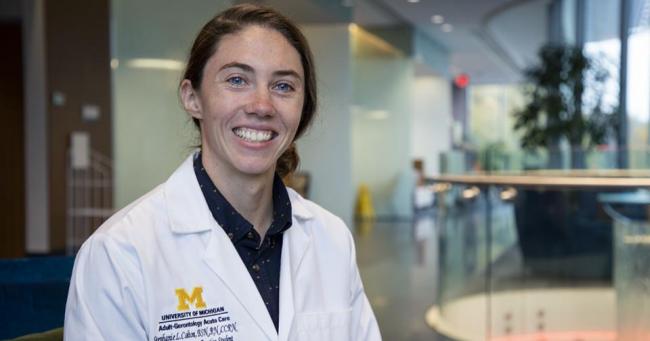Students who serve: Stephanie Colton, U.S. Army
 \
\
Stephanie Colton has always wanted to help other people. It’s a passion that inspired her to become a nurse and pushed her to join the U.S. Army in 2010. She completed her military service in 2017 as a first lieutenant and is now in her second year of the Adult-Gerontology Acute Care Nurse Practitioner Doctor of Nursing Practice degree program at the U-M School of Nursing.
A self-described adrenaline junkie, Colton recalled the moment she decided to become a nurse.
“I remember this nurse who was helping me in the ER after one of my numerous trips for broken bones. She inspired me, because I could see and feel that nurses are the backbone of the health care system,” she said.
Colton began serving as a nurse in 2013, starting out like any new Army nurse in the Clinical Nurses Transition Program. She spent most of her time stationed in Fort Bragg, North Carolina, and San Antonio, Texas, where she said she became a “jack of all trades,” working everywhere from the cardiac medical-surgical floor and inpatient pediatrics unit to the surgical trauma ICU, burn center and more. She even spent time on the Ebola team before her final stop in the Exceptional Family Member Program, which provides comprehensive support to Army families with special needs.
“All I ever wanted to do was be a surgical trauma ICU nurse, but the military teaches you to adapt and overcome, which was a big part of my service working in places that didn’t always seem like the right fit,” Colton said.
These wide-ranging experiences helped Colton build a unique skill set, but mentoring younger army nurses was her most rewarding military endeavor. In this role, she had the opportunity to further a tradition of selfless patient care and instill in others the army medic’s motto of “serving to heal, honor to serve.”
“Teaching, coaching and mentoring is everything in the military, and that’s affected how I approach nursing,” she said. “As nurses, we need to empower one another — that mindset helps build great interdisciplinary teams.”
As Colton continues her DNP studies, she’s started clinical rotations on a palliative care team and plans to research the implementation of ketamine to treat pain as part of her scholarly project. After graduation, she hopes to find a fellowship in emergency and trauma critical care, with a long-term goal to become a professor and flight nurse practitioner.
“That would be the ultimate adrenaline rush.”





